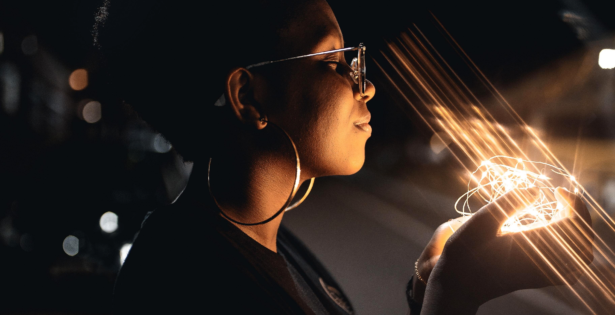As a weight-obsessed culture, we don’t often want to think of ourselves as big, but there’s an expression you hear once in a while – “That’s big of you” – and it means something good. TheFreeDictionary.com defines it as: “Noble or commendable” (unfortunately it adds, “this phrase is often said sarcastically”).
It’s as if we experience a person as somehow bigger when they embody their virtuousness. In contrast, when someone acts from animalistic drives, out of selfishness, fear, rigidity, or spite, we often see them as small.
These perceptions make sense because when we’re acting from our “big self,” we have access to a broader palette of options. We have the perspective to step back from the charged elements of a situation and choose who we want to be. When we’re in our “small self” we have few options; our emotions and narrow beliefs are in the driver’s seat.
This is why Briana and I so often lean on the words growth and expansion when discussing the work we do and the processes by which people overcome limitations. And it’s why we chose the name Sacred Expansion for our upcoming course.
When our kids were little, they would sometimes talk to us about getting older and what that meant. They’d proudly point out that they were older or bigger than some other kid, as if this signified a higher level of importance. And they would proclaim that when they got to be 20, or 30, or 100 years old, they’d be SO big and SO grown-up. Usually I would just enjoy this fantasy with them, but once in a while I’d explain that we don’t actually get much taller after our teen years . . . and many people don’t really continue to “grow up” after that age either.
The latter point was probably lost on them, but I think it’s important that they understand it as they get closer to being adults: our psychological makeup doesn’t necessarily get upgraded as our body matures. There are plenty of children in the world operating through adult bodies. Knowing this can make it easier to find compassion for each other.
This arrested development is mostly the result of our animalistic wiring (survival, pain avoidance, and pleasure-seeking) combined with restrictive programming from our parents and community. Each generation indoctrinates the next in both the wisdom and limitations of those who came before us. Often our socialization holds us back, instilling so many with a message that amounts to “life is a struggle; just get through it.”
But we can help each other. One inspired person can light up another, and from there the illumination can continue to spread. We all have the ability to liberate ourselves from the programming that holds us back. Often requires improving our self-awareness, honestly examining the ways we’re restricted, and choosing to release the beliefs and baggage that are degrading us. While this isn’t easy, it doesn’t have to be terrifying or tedious.
It can even be a process full of beauty and grace. That’s the idea behind Sacred Expansion. My wife, Briana, leads participants through a process of self-exploration that’s utilizes the imagery of the seasons and the language of the natural world that’s deep within each of us. Though it entails some work, the rewards come pretty quickly. While you recognize that you have a lifetime of growth and expansion ahead of you, you also know that you’ve got this. And it just gets better and better.
I heartily encourage you to join us. We start this Tuesday! And we always provide replays for those who can’t make it to the live sessions.
Be well,
Peter



 Cart
Cart
